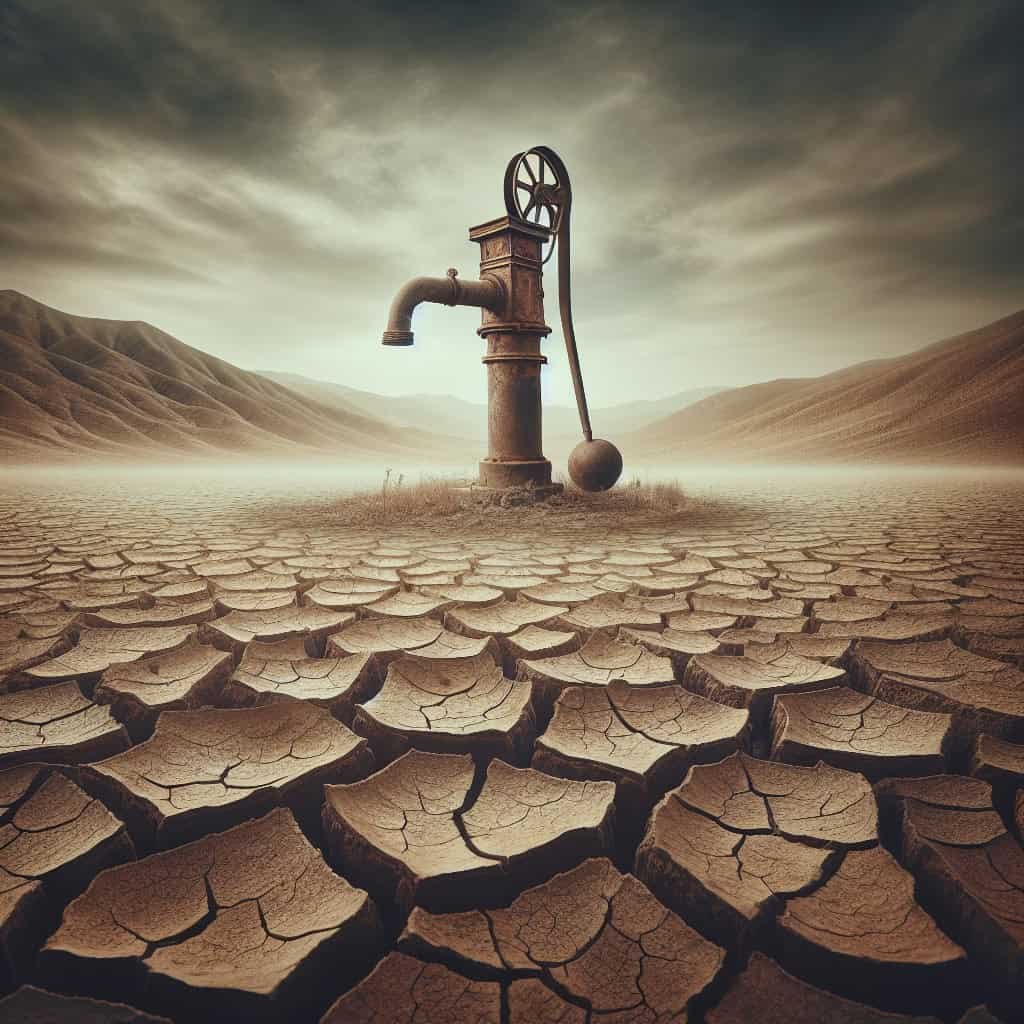In this article, you will discover a multitude of valuable resources geared towards well owners residing in areas with limited groundwater availability. We understand that accessing clean and reliable water is crucial for maintaining a sustainable and healthy lifestyle. Whether you’re seeking information on well maintenance, water conservation techniques, or alternative water sources, we’ve got you covered. Let us help you navigate the challenges of limited groundwater availability and find the necessary support to sustain your well and water needs.
Understanding Groundwater Availability
In order to find resources for well owners in areas with limited groundwater availability, it is important to have a good understanding of the groundwater availability in your specific area. This can be achieved through researching local geological surveys, exploring state and federal agencies, connecting with water conservation organizations, utilizing online databases and tools, engaging with cooperative extension services, seeking professional guidance, considering alternative water sources, understanding water conservation practices, and attending local government meetings.
Researching Local Geological Surveys
One of the first steps in finding resources for well owners in areas with limited groundwater availability is to research local geological surveys. These surveys are conducted by experts and provide valuable information about the geology and hydrology of the area. By understanding the local geology, you can get a better idea of the groundwater availability and potential challenges you may face as a well owner.
To get started, you can contact your local geological survey office. They can provide you with information on the availability of groundwater in your area, as well as any relevant reports or studies they have conducted. They may also be able to guide you towards additional resources that can help you in your quest for information.
Accessing Their Online Resources
In addition to contacting local geological survey offices, it is also worth exploring their online resources. Many geological survey offices have websites that provide access to a wealth of information, such as maps, reports, and data on well water availability. These online resources can be a valuable tool in understanding the groundwater situation in your area.
Take the time to navigate through the website of your local geological survey office. Look for sections that specifically address groundwater availability and any publications or data that may provide further insights.
Requesting Specific Well Water Data
If you need specific well water data for your area, it is worth requesting this information from your local geological survey office. They may have records of well depths, water levels, and other relevant data that can help you assess the availability of groundwater in your area.
When contacting the geological survey office, be sure to clearly communicate what specific data you are looking for. This will help them understand your needs and provide the most relevant information. Keep in mind that there may be a process or fee associated with accessing certain data.
Exploring State and Federal Agencies
State and federal agencies can also be valuable resources for well owners in areas with limited groundwater availability. These agencies often have departments or divisions that deal with environmental or public health issues, including groundwater management.
Contacting State Health or Environmental Departments
One way to find resources is by contacting your state health or environmental department. These departments are responsible for overseeing water quality and may have information or programs specifically tailored to well owners. They can provide guidance on water testing, well maintenance, and other relevant topics.
Reach out to your state health or environmental department and inquire about any resources they have available for well owners in areas with limited groundwater availability. They may direct you to publications, online resources, or even offer assistance through their personnel.
Consulting with the U.S. Geological Survey
The U.S. Geological Survey (USGS) is a federal agency that conducts extensive research on various natural resources, including groundwater. They have a wealth of information and data on groundwater availability across the country.
When researching resources for well owners in areas with limited groundwater availability, it is worth exploring the USGS website. They have a section dedicated to groundwater that provides access to maps, reports, and data that can be useful in understanding the availability of groundwater in your area.
Exploring the Environmental Protection Agency’s Website
Another federal agency that can provide valuable information for well owners is the Environmental Protection Agency (EPA). The EPA is responsible for protecting human health and the environment, and they have resources specifically related to water.
Take the time to explore the EPA’s website, particularly their sections on water resources and groundwater. They provide information on water conservation, water quality, and tips for well owners. Keep in mind that the EPA’s resources can vary by region, so be sure to look for information specific to your area.

Connecting with Water Conservation Organizations
Water conservation organizations are another great resource for well owners in areas with limited groundwater availability. These organizations focus on promoting sustainable water use and can provide guidance and support to well owners.
Reaching out to Local Water Conservation Groups
Start by reaching out to local water conservation groups in your area. These groups may have specific programs or resources for well owners dealing with limited groundwater availability. They can provide advice on water conservation techniques, information on local regulations, and even connect you with other well owners who may be facing similar challenges.
To find local water conservation groups, check with your local government or environmental organizations. They can point you in the right direction and provide contact information for these organizations.
Working with National Organizations
In addition to local organizations, there are also national water conservation organizations that can be helpful resources. These organizations often have online resources, publications, and even workshops or webinars that focus on water conservation for well owners.
Take the time to explore websites of national organizations such as the National Ground Water Association (NGWA) or the American Water Resources Association (AWRA). These organizations often have sections dedicated to well owners and can provide valuable insights and resources.
Attending Workshops or Webinars on Water Conservation
Attending workshops or webinars on water conservation is another way to find resources and connect with experts in the field. Many water conservation organizations offer these educational events, which can provide valuable information on topics such as well maintenance, efficient irrigation practices, and water-saving technologies.
Keep an eye out for workshops or webinars in your area or check the websites of water conservation organizations for upcoming events. Attending these events can not only provide you with valuable knowledge but also give you the opportunity to network with other well owners and water conservation professionals.
Utilizing Online Databases and Tools
Online databases and tools can provide valuable information and data on groundwater availability. These resources can help you assess the groundwater situation in your area and make informed decisions as a well owner.
Exploring the National Groundwater Association Database
The National Groundwater Association (NGWA) has developed a comprehensive database that provides information on groundwater resources across the United States. Their database includes well data, hydrologic information, and other relevant resources.
Take the time to explore the NGWA database and see what information is available for your area. You may be able to find data on water levels, well construction, and other factors that can help you better understand the availability of groundwater.
Using the Groundwater Resource Hub
The Groundwater Resource Hub is an online platform that provides access to a variety of tools and resources related to groundwater. It offers information on well drilling, well maintenance, water quality, and other issues that well owners may face.
Visit the Groundwater Resource Hub’s website and explore the different resources they have available. They offer tools such as well management plans, educational materials, and even a well owner hotline where you can get answers to your specific questions.
Accessing Local Online Well Logs
Many states and local governments maintain online databases or platforms that provide access to well logs. Well logs are records of well construction and can provide valuable information on the geology and water levels in your area.
Check with your local government or state agencies to see if they have an online platform where you can access well logs. These logs can be invaluable in understanding the groundwater availability in your area and making informed decisions as a well owner.

Engaging with Cooperative Extension Services
Cooperative Extension Services are a valuable resource for well owners. They are part of a nationwide network of educators who provide research-based information and support to local communities.
Contacting Local Cooperative Extension Offices
To engage with Cooperative Extension Services, start by contacting your local Cooperative Extension office. They can provide guidance on a variety of issues related to well ownership, including water conservation, well maintenance, and understanding local regulations.
Reach out to your local Cooperative Extension office and inquire about their resources for well owners. They may offer workshops, educational materials, or even direct assistance through their extension agents.
Attending Well Owner Workshops
Many Cooperative Extension offices offer well owner workshops that cover a wide range of topics related to well ownership and groundwater availability. These workshops are usually led by experts in the field and provide valuable information and hands-on learning opportunities.
Keep an eye out for well owner workshops in your area and consider attending. These workshops can provide you with practical knowledge, tips, and resources that can help you make the most of your well while dealing with limited groundwater availability.
Requesting Assistance from Extension Educators
If you need specific assistance or guidance as a well owner, don’t hesitate to reach out to extension educators. These professionals are knowledgeable about well ownership and can provide personalized advice based on your specific situation.
Contact your local Cooperative Extension office and inquire about the possibility of speaking with an extension educator. They may be able to provide you with recommendations, resources, or even conduct site visits to assess your well and provide guidance.
Seeking Professional Guidance
Sometimes, it is necessary to seek professional guidance to address specific challenges with limited groundwater availability. Hydrogeologists, water well contractors, and licensed well inspectors can provide expertise and support.
Consulting with Hydrogeologists
Hydrogeologists are experts in the study of groundwater and can provide valuable insights into the availability and quality of groundwater in your area. If you are facing challenges with limited groundwater availability, consulting with a hydrogeologist can help you better understand the situation and explore potential solutions.
To find a hydrogeologist, check with your local geological survey office, state agencies, or professional organizations such as the National Ground Water Association. These sources can provide you with recommendations and contact information for qualified hydrogeologists in your area.
Hiring Water Well Contractors
Water well contractors are professionals who specialize in drilling, constructing, and maintaining water wells. They have hands-on experience and knowledge when it comes to well-related issues, including limited groundwater availability.
If you are experiencing challenges with groundwater availability or need assistance with well maintenance, consider hiring a water well contractor. They can assess your well, suggest appropriate solutions, and even drill deeper wells if necessary.
When hiring a water well contractor, be sure to research their credentials, experience, and reputation. Ask for references, get multiple quotes, and carefully review any contracts or agreements before moving forward.
Working with Licensed Well Inspectors
Licensed well inspectors are professionals who are trained to assess the condition and safety of water wells. They can provide valuable information and recommendations on well maintenance, efficiency, and potential issues related to groundwater availability.
If you have concerns about your well or want to ensure its proper functioning, consider hiring a licensed well inspector. They can conduct inspections, identify any problems, and provide guidance on how to address them.
When hiring a licensed well inspector, it is important to check their credentials and make sure they are properly licensed and certified. Ask for references and inquire about their experience with well inspections.

Considering Alternative Water Sources
In areas with limited groundwater availability, it may be necessary to consider alternative water sources. Rainwater harvesting, graywater systems, and community water systems are some options to explore.
Exploring Rainwater Harvesting
Rainwater harvesting involves collecting and storing rainwater for future use, typically in a cistern or barrel. It can be a sustainable and cost-effective way to supplement or replace groundwater as a water source.
Consider exploring rainwater harvesting as an alternative water source in areas with limited groundwater availability. Look into the regulations and guidelines in your area, and consider the feasibility of collecting and storing rainwater on your property.
Investigating Graywater Systems
Graywater systems involve capturing and reusing wastewater from sources such as showers, sinks, and washing machines for non-potable purposes, such as irrigation or certain household uses. It can help reduce reliance on groundwater for non-drinking water needs.
If groundwater availability is limited, consider investigating the possibility of installing a graywater system. Consult with local authorities, professionals, or water conservation organizations to determine the feasibility and regulations regarding graywater systems in your area.
Considering Community Water Systems
Community water systems can be an alternative to individual wells in areas with limited groundwater availability. These systems involve connecting to a centralized water supply, which can provide a more reliable and sustainable water source.
If access to groundwater is a significant challenge, investigating the option of connecting to a community water system may be worth considering. Contact your local water management authority or relevant government agencies to explore the availability and requirements of community water systems in your area.
Understanding Water Conservation Practices
When dealing with limited groundwater availability, it is crucial to practice efficient water usage and conservation techniques. This can help reduce demand on the groundwater supply and ensure the sustainable use of water resources.
Learning About Efficient Water Usage
To practice efficient water usage, it is important to educate yourself on best practices and techniques. This can include learning about water-efficient appliances, landscaping strategies, and water-saving habits.
Take the time to research and educate yourself on efficient water usage. Look for resources from water conservation organizations, government agencies, and reputable websites. Implementing these practices can make a significant difference in reducing water consumption and reliance on limited groundwater.
Implementing Conservation Techniques
Once you have learned about efficient water usage, it is important to implement conservation techniques in your daily life. This can include things like fixing leaks, using water-efficient appliances and fixtures, and adopting water-saving habits.
Make a conscious effort to incorporate water conservation techniques into your daily routine. Every small change can contribute to reducing water consumption and preserving limited groundwater resources.
Monitoring and Maintaining Wells
Regular monitoring and maintenance of wells are essential for well owners, especially in areas with limited groundwater availability. By keeping a close eye on your well, you can identify and address any issues before they become more significant.
Implement a well monitoring and maintenance schedule to ensure your well is functioning optimally. This can include regular water level monitoring, well inspections, and regular maintenance tasks such as cleaning and disinfection. Consult with professionals or resources provided by local agencies to ensure you are properly maintaining your well.

Attending Local Government Meetings
Local government meetings can be a platform for well owners to get involved, voice their concerns, and advocate for their interests. By participating in town hall meetings and connecting with local water management authorities, well owners can play an active role in addressing the challenges of limited groundwater availability.
Participating in Town Hall Meetings
Town hall meetings provide a space for community members, including well owners, to engage in discussions and share their perspectives with local government officials. Attending these meetings can be an opportunity to raise awareness about issues related to limited groundwater availability and advocate for appropriate actions.
Stay informed about upcoming town hall meetings in your community and make an effort to attend. Prepare your talking points in advance and be ready to express your concerns and suggestions regarding limited groundwater availability. The more well owners participate, the stronger their collective voice becomes.
Connecting with Local Water Management Authorities
In addition to attending town hall meetings, it can also be beneficial to connect with local water management authorities. These authorities are responsible for managing and overseeing water resources in your area and can provide valuable insights and resources for well owners.
Reach out to your local water management authority and inquire about any resources or programs they have available for well owners. They may be able to provide guidance on water conservation, relevant regulations, or even offer assistance for well owners dealing with limited groundwater availability.
Advocating for Well Owners’ Interests
Lastly, attending local government meetings also provides an opportunity to advocate for the interests of well owners. By raising awareness about the challenges of limited groundwater availability and proposing solutions, well owners can have a direct impact on decision-making processes.
Take an active role in advocating for the interests of well owners in your community. Use your voice to communicate the importance of protecting and preserving groundwater resources, and encourage local government officials to consider policies and initiatives that support well owners in areas with limited groundwater availability.
By utilizing the resources and strategies outlined above, well owners in areas with limited groundwater availability can gain a deeper understanding of the situation, connect with relevant organizations and professionals, and take proactive steps to ensure the sustainable use of water resources. Remember, your local geological survey offices, state and federal agencies, water conservation organizations, online databases and tools, cooperative extension services, professionals in the field, alternative water sources, water conservation practices, and local government meetings can all provide valuable resources and support as you navigate the challenges of limited groundwater availability as a well owner.

